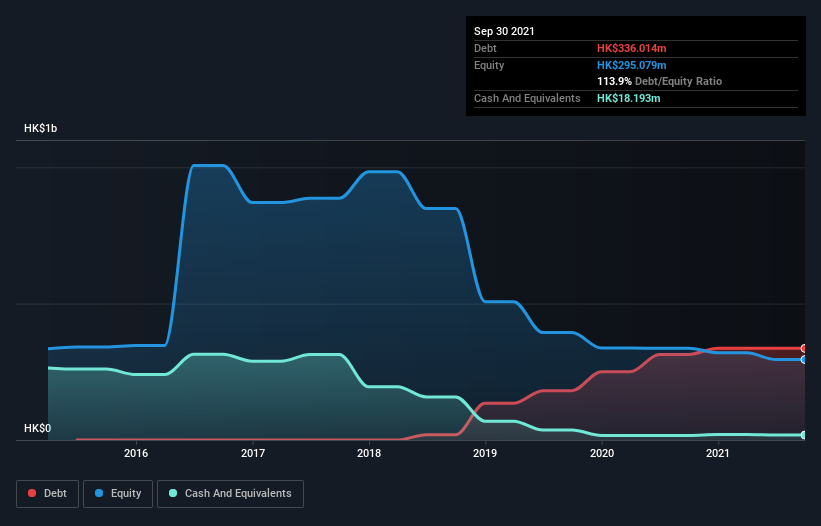- Hong Kong
- /
- Personal Products
- /
- SEHK:6893
Is Hin Sang Group (International) Holding (HKG:6893) Using Debt In A Risky Way?

The external fund manager backed by Berkshire Hathaway's Charlie Munger, Li Lu, makes no bones about it when he says 'The biggest investment risk is not the volatility of prices, but whether you will suffer a permanent loss of capital.' It's only natural to consider a company's balance sheet when you examine how risky it is, since debt is often involved when a business collapses. Importantly, Hin Sang Group (International) Holding Co. Ltd. (HKG:6893) does carry debt. But should shareholders be worried about its use of debt?
When Is Debt Dangerous?
Debt and other liabilities become risky for a business when it cannot easily fulfill those obligations, either with free cash flow or by raising capital at an attractive price. Ultimately, if the company can't fulfill its legal obligations to repay debt, shareholders could walk away with nothing. While that is not too common, we often do see indebted companies permanently diluting shareholders because lenders force them to raise capital at a distressed price. Of course, the upside of debt is that it often represents cheap capital, especially when it replaces dilution in a company with the ability to reinvest at high rates of return. The first step when considering a company's debt levels is to consider its cash and debt together.
View our latest analysis for Hin Sang Group (International) Holding
What Is Hin Sang Group (International) Holding's Net Debt?
You can click the graphic below for the historical numbers, but it shows that as of September 2021 Hin Sang Group (International) Holding had HK$336.0m of debt, an increase on HK$313.7m, over one year. On the flip side, it has HK$18.2m in cash leading to net debt of about HK$317.8m.

How Healthy Is Hin Sang Group (International) Holding's Balance Sheet?
According to the last reported balance sheet, Hin Sang Group (International) Holding had liabilities of HK$169.1m due within 12 months, and liabilities of HK$213.5m due beyond 12 months. Offsetting these obligations, it had cash of HK$18.2m as well as receivables valued at HK$13.8m due within 12 months. So it has liabilities totalling HK$350.6m more than its cash and near-term receivables, combined.
This deficit is considerable relative to its market capitalization of HK$360.3m, so it does suggest shareholders should keep an eye on Hin Sang Group (International) Holding's use of debt. This suggests shareholders would be heavily diluted if the company needed to shore up its balance sheet in a hurry. There's no doubt that we learn most about debt from the balance sheet. But it is Hin Sang Group (International) Holding's earnings that will influence how the balance sheet holds up in the future. So when considering debt, it's definitely worth looking at the earnings trend. Click here for an interactive snapshot.
Over 12 months, Hin Sang Group (International) Holding made a loss at the EBIT level, and saw its revenue drop to HK$98m, which is a fall of 34%. To be frank that doesn't bode well.
Caveat Emptor
Not only did Hin Sang Group (International) Holding's revenue slip over the last twelve months, but it also produced negative earnings before interest and tax (EBIT). Its EBIT loss was a whopping HK$41m. When we look at that and recall the liabilities on its balance sheet, relative to cash, it seems unwise to us for the company to have any debt. Quite frankly we think the balance sheet is far from match-fit, although it could be improved with time. Another cause for caution is that is bled HK$75m in negative free cash flow over the last twelve months. So suffice it to say we consider the stock very risky. The balance sheet is clearly the area to focus on when you are analysing debt. However, not all investment risk resides within the balance sheet - far from it. For instance, we've identified 3 warning signs for Hin Sang Group (International) Holding (2 are concerning) you should be aware of.
If you're interested in investing in businesses that can grow profits without the burden of debt, then check out this free list of growing businesses that have net cash on the balance sheet.
If you're looking to trade Hin Sang Group (International) Holding, open an account with the lowest-cost platform trusted by professionals, Interactive Brokers.
With clients in over 200 countries and territories, and access to 160 markets, IBKR lets you trade stocks, options, futures, forex, bonds and funds from a single integrated account.
Enjoy no hidden fees, no account minimums, and FX conversion rates as low as 0.03%, far better than what most brokers offer.
Sponsored ContentValuation is complex, but we're here to simplify it.
Discover if Hin Sang Group (International) Holding might be undervalued or overvalued with our detailed analysis, featuring fair value estimates, potential risks, dividends, insider trades, and its financial condition.
Access Free AnalysisHave feedback on this article? Concerned about the content? Get in touch with us directly. Alternatively, email editorial-team (at) simplywallst.com.
This article by Simply Wall St is general in nature. We provide commentary based on historical data and analyst forecasts only using an unbiased methodology and our articles are not intended to be financial advice. It does not constitute a recommendation to buy or sell any stock, and does not take account of your objectives, or your financial situation. We aim to bring you long-term focused analysis driven by fundamental data. Note that our analysis may not factor in the latest price-sensitive company announcements or qualitative material. Simply Wall St has no position in any stocks mentioned.
About SEHK:6893
Hin Sang Group (International) Holding
Hin Sang Group (International) Holding Co.
Low with worrying balance sheet.
Market Insights
Community Narratives



